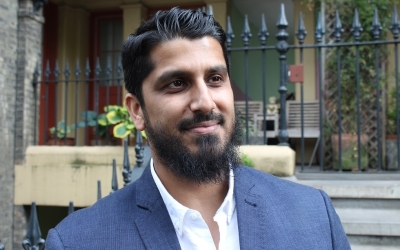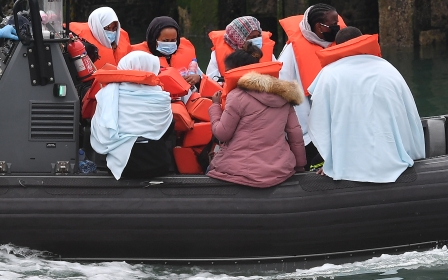UK Nationality and Borders Bill: Refugees to face Schedule 7 counter-terror searches

Refugees and migrants reaching the UK aboard small boats could soon be interrogated and searched under Schedule 7 counter-terrorism powers set to be extended by the government’s controversial Nationality and Borders Bill.
Schedule 7 powers currently allow police and border officials to question and search travellers passing through British airports and ports to determine if they are involved in terrorism without any reason for suspicion.
'This is about criminalising refugees and not about the safety and security of our nation'
- Muhammad Rabbani, Cage
A proposed change to the 2000 Terrorism Act contained in the Nationality and Borders Bill, which is currently being considered in Parliament, would extend the powers to apply to anyone held for immigration processing after arriving by irregular sea routes.
Travellers can be detained and questioned for up to six hours under the powers. They must provide passwords and logins for phones and electronic devices, the contents of which can be downloaded and retained. Examining officers can collect fingerprints and DNA samples.
People detained under Schedule 7 powers, including children, may also be subjected to strip searches including “visual examinations of the genital and anal areas”, though guidelines for examining officers say these “must not be undertaken routinely”.
New MEE newsletter: Jerusalem Dispatch
Sign up to get the latest insights and analysis on Israel-Palestine, alongside Turkey Unpacked and other MEE newsletters
The powers have been criticised by human rights campaigners as discriminatory because they have been disproportionately used against travellers from Muslim and ethnic minority backgrounds.

In 2019, the European Court of Human Rights ruled that Schedule 7 powers had been exercised in a way that violated human rights and lacked sufficient legal safeguards.
The proposed extension of the powers comes as the Home Office was last week forced to admit that it had been operating an unlawful policy of seizing mobile phones from all people crossing the Channel by boat in a court case brought by asylum seekers from Iran and Iraq.
According to a human rights memorandum prepared by the government, the extension of Schedule 7 powers is necessary because of the increasing numbers of people reaching the UK in small boats across the English Channel.
“The current issue arises because the powers in Schedule 7 only allow examination at a port or border area,” the memorandum says.
“Although the existing definition of ‘port’ is quite wide and can capture any beach or stretch of coastline where a person might come ashore, in practice it is unfeasible for Schedule 7 powers to be exercised otherwise than at established ports as there are not the facilities or staff present to be able to carry out the Schedule 7 examinations or detain vulnerable individuals.”
'Any floating vessel'
Under the proposed legislation, counter-terrorism police officers would be able to question, detain and search anyone being held for immigration processing within five days of their arriving in the UK aboard “any floating vessel or structure”.
According to Home Office figures, more than 28,000 people crossed the Channel on small boats in 2021, a figure three times more than in 2020.
The top four countries of origin of those reaching the UK between January 2020 and May 2021 were Iran, Iraq, Sudan and Syria. Research by the Refugee Council published in November found that 98 percent of people crossing the Channel subsequently applied for asylum.
“The reality is that people who come to the UK by taking terrifying journeys in small boats across the Channel do so because they are desperately seeking safety having fled persecution, terror and oppression,” said Enver Solomon, the Refugee Council’s chief executive.
The UK government has sought to link its efforts to reduce irregular migration to the issues of security and terrorism.
Speaking after an Iraqi-born man whose asylum appeal had been rejected killed himself by detonating a bomb in a taxi outside a Liverpool hospital in November, Priti Patel, the home secretary, said the case was a consequence of a “dysfunctional” asylum system.
The Nationality and Borders Bill has prompted widespread criticism and protests during its passage through parliament.
Critics say it will criminalise and punish asylum seekers by making undocumented migration an offence, as well as potentially criminalising people who help others in danger to safety.
The United Nations refugee agency, the UNHCR, says the bill, if passed into law, would “penalise most refugees seeking asylum in the country, creating an asylum model that undermines established international refugee protection rules and practices”.
One of the most contentious elements of the bill has been proposed legislation extending the government’s powers to strip British nationals of their citizenship by allowing it to do so without notifying those targeted.
'Criminalising refugees'
Commenting on the proposed extension of Schedule 7 powers, Muhammad Rabbani, the managing director of Cage, a rights group focused on the impact of counter-terrorism policies on Muslim communities, told MEE: “This is about criminalising refugees and not about the safety and security of our nation.”
In 2017, Rabbani was convicted of a terrorism offence after refusing to reveal passwords for his phone and laptop during a Schedule 7 stop at Heathrow Airport. He said he had been stopped under the powers “countless times”.
“Schedule 7 is a draconian power and a manifestation of institutional Islamophobia. It operates without the need of any suspicion of a crime and continues to strip individuals of their basic rights and access to due process,” he said.
"If this bill passes then refugees will be subject to the same powers when they arrive, further embedding the discrimination and Islamophobia of this policy.”
The House of Lords, the upper house of the UK Parliament, is currently considering proposed amendments to the Nationality and Borders Bill, which will then return to the House of Commons for the final approval of MPs.
But no amendments have so far been tabled regarding the proposed extension of Schedule 7 powers.
A Home Office spokesperson told MEE: “Migrants can already be searched under Schedule 7 powers upon arrival in the UK. Through the New Plan for Immigration we are extending where these searches - which can only be conducted by specially trained police officers - can take place.
"These searches are completely separate from the seizure of mobile phones and will not be used on all arrivals.”
Middle East Eye delivers independent and unrivalled coverage and analysis of the Middle East, North Africa and beyond. To learn more about republishing this content and the associated fees, please fill out this form. More about MEE can be found here.






